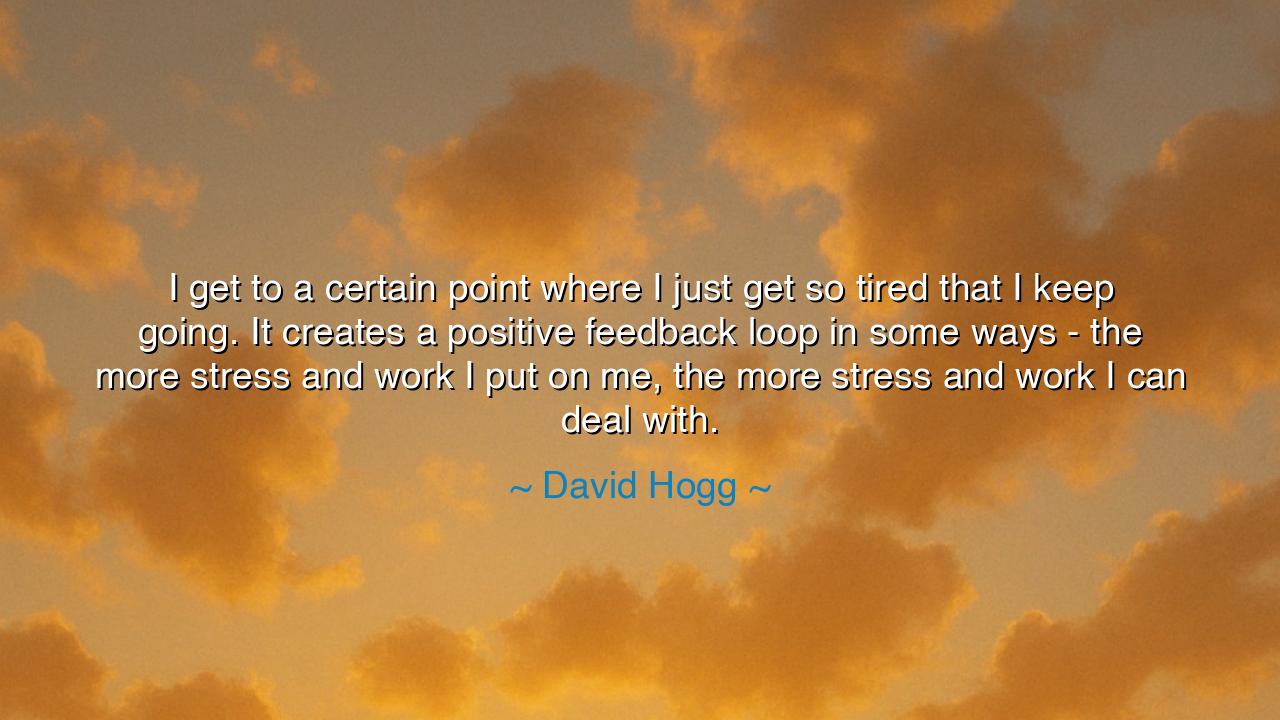
I get to a certain point where I just get so tired that I keep
I get to a certain point where I just get so tired that I keep going. It creates a positive feedback loop in some ways - the more stress and work I put on me, the more stress and work I can deal with.






The words of David Hogg—“I get to a certain point where I just get so tired that I keep going. It creates a positive feedback loop in some ways—the more stress and work I put on me, the more stress and work I can deal with.”—sound like the battle hymn of one who has walked through exhaustion and discovered strength on the other side. He reveals the paradox known to warriors, prophets, and builders: that when the body and mind are pressed to their limits, something awakens within, and endurance is forged in fire. Tiredness becomes not the end, but the threshold; and crossing that threshold, one enters a realm of deeper resilience.
The origin of this wisdom lies in the human struggle itself. From the earliest hunters who pursued prey across endless plains, to the monks who endured sleepless nights in prayer, people have found that stress and strain, though heavy, can expand the capacity of the soul. The positive feedback loop that Hogg names is not a trick of science alone but a truth of spirit: hardship, when embraced with purpose, multiplies strength. Each burden carried trains the heart to carry more, until what once seemed impossible becomes second nature.
Consider the march of Alexander the Great, whose army crossed deserts and mountains that broke lesser men. His soldiers, worn and weary, discovered that each trial built in them new endurance. They became capable of feats they never imagined, because in their tiredness, they kept going. Their strength was not born in comfort but in the crucible of stress and work, and from this fire emerged conquests that shaped the world.
Or think of Harriet Tubman, who led enslaved people to freedom across perilous paths, again and again. The weight of fear, the endless nights, the relentless pursuit by enemies—all might have crushed her. Yet the more danger and work she carried, the more fearless she became. She did not stop when she was weary; she kept going, and her endurance became legendary. Hers too was a positive feedback loop, where courage grew not in spite of trial but because of it.
The meaning of Hogg’s words is not that one should recklessly drown in stress, but that true growth is often found beyond the point of exhaustion. Comfort lulls us into weakness, but challenge awakens hidden reserves of strength. To stop when you are tired is to know only half of yourself; to keep going is to discover the deeper self, the one forged of iron and spirit.
The lesson here is radiant: when you reach the wall of your strength, do not turn back in despair. Lean into it. Push once more. For beyond the wall lies the greater strength waiting to be born. Each time you face work and stress and do not yield, you expand your capacity to endure. This is the eternal rhythm of resilience: burden becomes training, trial becomes preparation, and struggle becomes strength.
Practical wisdom calls us to act. Do not fear the weight of responsibility—embrace it. Set goals that stretch your spirit. When tiredness comes, see it not as an end but as a sign that you stand on the edge of growth. Breathe, steady yourself, and take another step. Build your own positive feedback loop, where each effort deepens your ability to carry more. In this way, your life itself becomes training for greatness.
Thus, let Hogg’s words endure as counsel for all generations: strength is not found in avoiding stress, but in transforming it into resilience. Do not curse the weight upon your shoulders; let it carve in you a spirit that no trial can break. For the more you carry, the more you can carry, until at last you discover that endurance itself has made you unshakable.






PBPham Bao
David Hogg’s approach to stress makes me think about how people sometimes embrace the grind, believing that it will make them stronger. But I question whether this 'positive feedback loop' always works in a healthy way. Can we train ourselves to handle more stress, or is there a point where it becomes counterproductive? How do we ensure that we’re growing without sacrificing our well-being in the process?
TNT09KT0225 Tran Thanh Ngan
The concept of a 'positive feedback loop' through stress and hard work is fascinating. It seems like David Hogg is describing a cycle of self-improvement by constantly stepping up to the plate. However, can this mindset backfire? I wonder if the pressure of constantly needing to do more can sometimes cloud one’s ability to reflect or think critically. Is there a risk of losing touch with what truly matters by focusing too much on the workload?
VKTra Ngoc Van Khanh
I find this quote interesting because it speaks to the resilience many people develop when faced with stress. It's almost as if pressure can be a motivator, helping one to adapt and handle even more in the future. But I’m curious, does this mindset sometimes prevent people from acknowledging their limits? How do we strike a balance between building resilience and avoiding excessive stress that could be harmful in the long run?
LTLong Truong
David Hogg’s statement about pushing through exhaustion really resonates with me. It’s like the idea that your limits expand the more you push them. But I also wonder, how sustainable is this approach? Can constantly overworking lead to burnout, or is there a point where the 'positive feedback loop' becomes too much? Shouldn’t there be a balance between pushing through and knowing when to rest?